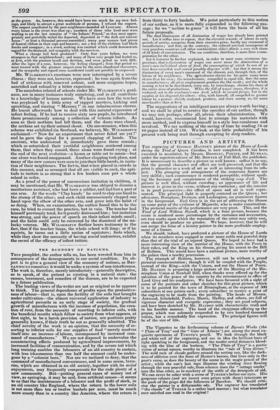THE ECONOMY OF NATIONS.
THIS pamphlet, the author tells us, has been wrested from him in consequence of the derangements in our social condition. Its ob- ject is to give a general view of the economy of nations, as BRI- TANNICUS conceives it would be under a system of non-interference. The work is, therefore, merely introductory—generally descriptive, so to speak, of the patient as existing in a natural state : the causes, treatment, and remedies of the disease, are to be expected in a future publication.
The leading views of the writer are not so original as he appears to think. The general dependence of profits upon the productive- ness of labour—that is, upon the fertility of the soils last brought under cultivation—the almost universal application of industry to agricultural pursuits in an early stage of society, the gradual growth of manufactures with the increase of population, the crea- tion of rent, from the necessity of resorting to inferior soils, with the beneficial results which follow to society from what appears, at first sight, to be a harsh provision of nature, are positions pretty generally known, if their truth be not as generally admitted. The chief novelty of the work is an opinion, that the necessity of re- sorting to inferior soils for our supplies of food "merely resolves itself into an increase of labour, recompensed by increased com- mand of manufactures." We are not disposed to undervalue the counteracting effects produced by agricultural improvements, by increased facilities of communication, and by the severe toil which long training enables the labourers of an old country to sustain,. with less irksomeness than one half the amount could be under- gone by a "colonist born." Nor are we inclined to deny, that the command of manufactured conveniences, and in some sense, luxu- ries, which are obtained in an old society, together with its social enjoyments, may frequently compensate for the rude plenty of a new community. But—putting general cases of misery out of view, as springing, it may be said, from artificial causes—it seems taus that the maintenance of a labourer and the profit of stock, in an old country like England, where the return to the lower soils is not more than ten or twelve bushels per acre, must be much more scanty than in a country like America, where the return is
from thirty to forty bushels. We point particularly to this notion of our author, as it is more fully expounded in the following pas-, sage ; for we "incline to guess" it will form the basis of all his: future proposals.
The final illusiveness of all diminution of wages has already been pointed out. Let it suffice here to repeat, that the elevated rewards of labour in early periods of society, comprise, from their excessive price, hardly any command of manufactures ; and that, on the contrary, the reduced nominal recompense of very populous countries (all other combinations alike) affords a very rich share of all kinds of conveniences. The one condition, therefore, is more than a com- pensation for the other.
Let it however he further explained, in order to meet some erroneous im- pressions, that 'et diminution of wages can never mean the diminution of a man's owl, ini!ieithial share of food, the consumption of which he can at no time have exceeded, and cannot possibly dispense with ; but that it means the diminution of every man's command of the aliment, and, through that, of the labour of his neighbours. The agriculturist obtains for his pains many more shares than his own; the manufacturer, compelled to equal toil, does the same in manufactures ; all other employments produce the like result ; and the whole coming at last to be disti ibuted, every one, by interchange, obtains his share of the entire mass of productions. TVhen the fall of wages comes, therefore, it is reckoned, not in the workman's own food, •which lie cannot forego, but in the surplus at his disposal for others ; Who, with himself, all compelled to greater
labour by a process already analyzed, produce, and share among us, far more merchandise than at first.
The suggestions of an intelligent man are always worth having ; and we shall be glad to receive the specifics of our author, though we may not, perhaps, after all, advise their administration. We would, however, recommend him to arrange his materials with more method, and to express himself in a style less cumbrous and involved. We say nothing of the saving of time by reading 70 or 80 pages instead of 130. We look at the little probability of his present work being read through excepting by duty readers. _



























 Previous page
Previous page